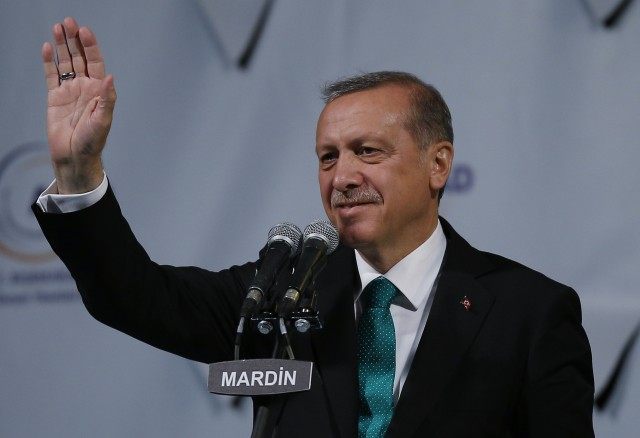Facing up to four-and-a-half years in prison if found guilty, two Turkish newspaper commentators went on trial yesterday for illustrating columns with a cartoon of Mohammed.
Charges of “inciting public hatred” and “insulting religious values” were brought against Ceyda Karan and Hikmet Cetinkaya by over 100 plaintiffs including close relatives of President Erdogan (pictured above).
AFP reports that although many of the plaintiffs attended the first hearing on Thursday, Karan and Cetinkaya, both writers at the centre-left secular newspaper Cumhuriyet which is strongly critical of Erdogan’s Presidency, were no shows saying they were out of Istanbul on business. The hearing was adjourned to 12 October.
In January Cumhuriyet published a four-page Turkish language sample of Charlie Hebdo. It commemorated the satirical weekly’s first issue following the Islamist terrorist attack that killed 12 people at its offices. While it did not include the front cover featuring Mohammed, a smaller version of the cartoon was twice used inside the main newspaper to illustrate columns on the subject by Karan and Cetinkaya.
An editorial in that newspaper said the Charlie Hebdo cover drawing did not seem to have “anything to do with Prophet Mohammed. That drawing is a symbol of a humane and conscientious attitude and it says, ‘All is forgiven.'” Nevertheless CNN reports people called the Cumhuriyet offices following publication to issue death threats.
At the time Deputy Prime Minister Yalcin Akdogan described the publication as “open incitement and provocation”, adding: “Those who are publishing figures referring to our supreme Prophet are those who disregard the sacred.”
President Erdogan’s son, daughter and son-in-law (Berat Albayrak, elected to the Turkish Parliament in June) asked to be plaintiffs in the case. This comes at a time of growing domestic and international concern about the numbers of journalists facing legal proceedings in Turkey, many on accusations of insulting the President.
Erdogan himself caused outrage in the run-up to Turkey’s June election when he said the Cumhuriyet newspaper editor-in-chief would “pay a heavy price” for a front-page story alleging proof that Turkey had sent arms to Syrian rebels.
The chilling effect of political pressure on the Turkish media is of particular interest to European observers conscious of the fact the country hopes to become a member of the European Union.
Turkey has been an associate member of the EU, in its various forms, since 1963. It applied for full membership of what was the European Economic Community in April 1987, however it faced an uphill struggle achieving that even before Erdogan, with his roots in Islamist politics, became President.
Austria, Germany and France are all strong opponents of Turkish accession. In addition opinion polls in the Czech Republic, Italy, Poland, Spain and the UK all suggest majorities opposing it in those countries even when, as in the case of British Prime Minister David Cameron, the political classes support it.
Follow Sarkis Zeronian on Twitter: Follow @SarkisZ or e-mail to: szeronian@breitbart.com

COMMENTS
Please let us know if you're having issues with commenting.